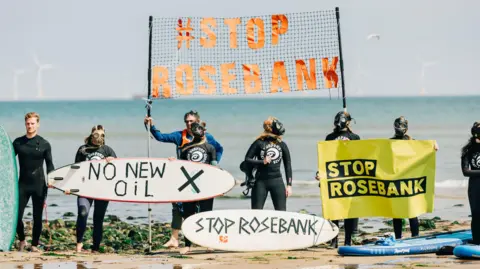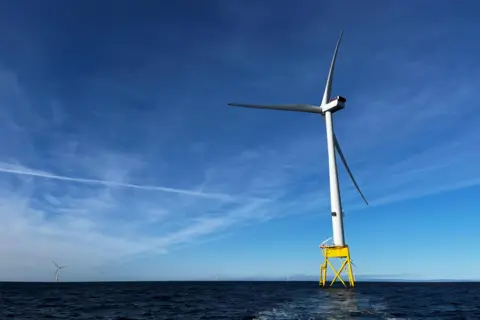[ad_1]
By Kevin Keane, BBC Scotland environment correspondent
 PA Media
PA Media“Do you support new oil and gas licences, yes or no?”
That’s the binary question which has been at the centre of the political debate in Scotland since parties began preparing to fight the general election.
Political leaders have been hurling accusations that 100,000 jobs in Scotland will be at risk if no more licences are issued.
But that figure is 40,000 more than the total number of people in Scotland whose roles currently rely directly or indirectly on fossil fuel extraction.
And analysis by BBC Scotland News suggests that new licences will only extend the life of the North Sea by up to five years at today’s production levels.
The North Sea Transition Authority (NSTA) – which issues licences – estimates that about two billion barrels of “unlicenced” oil remains. Last year the industry produced 440 million barrels.
Environmentalists have been campaigning for governments to stop issuing exploration licences which allow oil companies to search for new discoveries of fossil fuels.
The industry says without new oil finds, the rate at which the sector declines will accelerate – putting jobs at risk.
It is now 25 years since production peaked in the North Sea. In 1999, the equivalent of about 1.7 billion barrels of oil and gas was pumped ashore.
Output had dropped to 884 million barrels by 2010, then plummeted further to 552 million in 2022, a fall of about 67% on peak levels.
Government predictions suggest output will halve again by 2030 to 251 million barrels and fall as low as 58 million by 2050 – which is just 3% of peak production.
That’s because when the oil boom came we targeted the biggest reserves first which were easiest to exploit.
Nowadays, operators are focused on the remaining smaller wells and using much more advanced – and expensive – techniques to extract it.
While the North Sea Transition Authority estimates that the UK has around 10 to 15 billion barrels of oil and gas remaining, only about two billion are in areas where the UK government has so far not issued licences for operators to explore.
The suggestion that 100,000 North Sea jobs could be at risk without new exploration licences came from Aberdeen and Grampian Chamber of Commerce.
Using data from the investment banking firm Stifel, it produced a report last month saying the next Westminster government had “just 100 days to save 100,000 jobs” in the industry across the UK.
During the general election campaign the Conservatives and SNP have repeatedly asserted that by promising to end exploration licences, their opponents risk 100,000 Scottish jobs.

The Conservatives fully support continued licences while the SNP say applications should be considered on a case-by-case basis.
Labour has said it will issue no more licences and the Liberal Democrats believe the focus should be on creating more jobs in renewable energy like wind power.
The Scottish Greens would go furthest of all, by rescinding recently issued licences including 54 which were granted in October and January.
Offshore Energies UK estimates that there are now only 60,700 people in Scotland who work directly or indirectly in oil and gas. That number rises to 120,000 across the UK as a whole.
Research by Robert Gordon University (RGU) estimates that in the worst case scenario the number of oil and gas jobs lost in the UK by 2030 could reach 60,000.
It predicts that even on a best case scenario, with new licenses continuing and investment returning, some 33,000 jobs will still go as a result of falling oil and gas production.
So by their estimate, the actual number of jobs “at risk” is 27,000 across the whole UK, not just Scotland.
Job forecasts
The industry argues that more investment in future oil and gas production will directly affect the total number of jobs which can be created in green industries, like hydrogen and wind, because it keeps supply chains going.
The most optimistic forecast from RGU suggested there could be 104,000 jobs in UK renewables by 2030 – but it said this could be as low as 36,000 if there was low investment.
Offshore Energies UK says the sector is ready to invest £450bn in the UK economy by 2040 with support from government.
The industry says it can scale up the supply chain capacity, sustain skilled jobs and deliver energy security – all while delivering on climate goals.
But be in no doubt, that means allowing them to keep drilling for more oil.

[ad_2]
Source link




